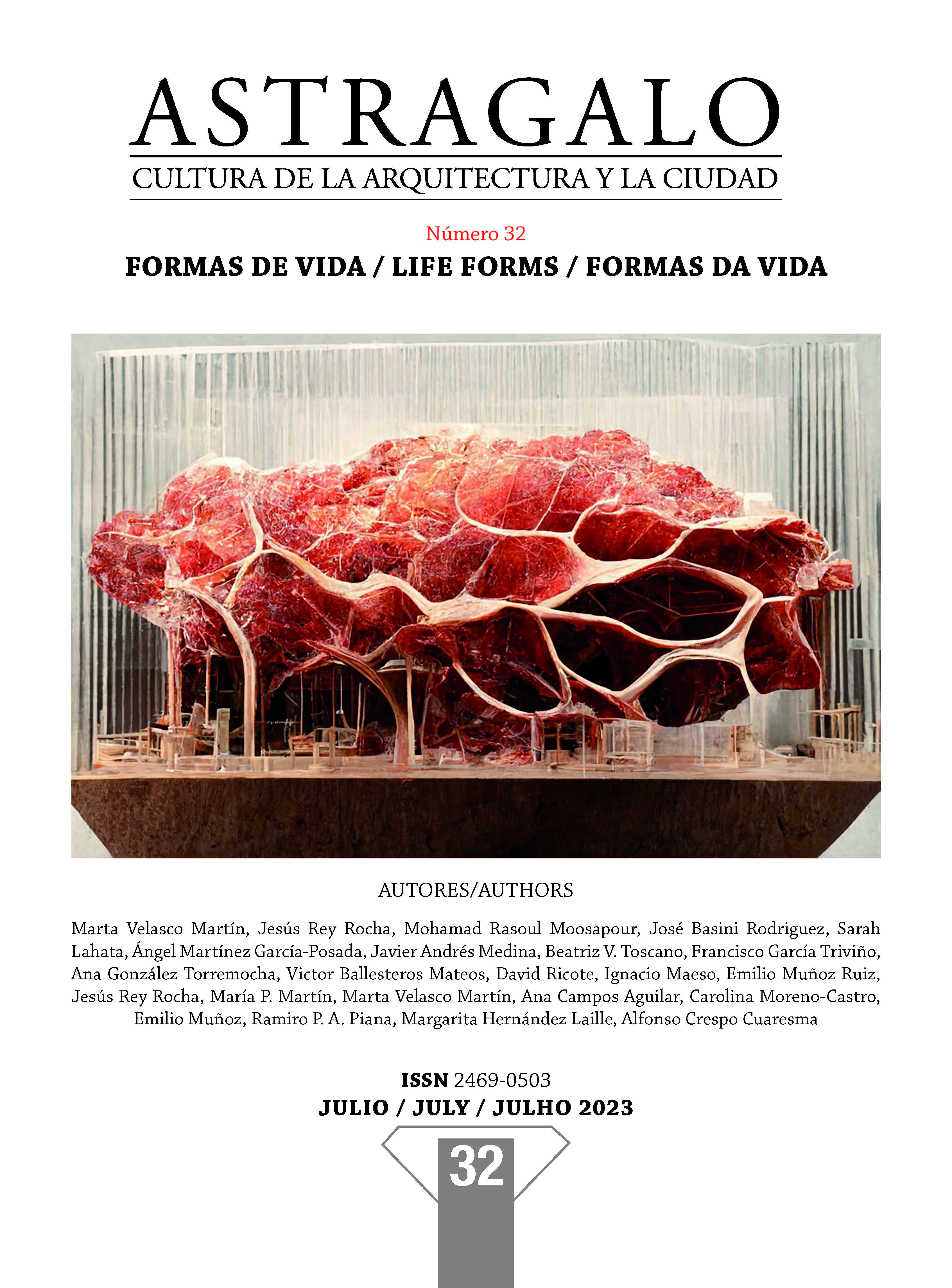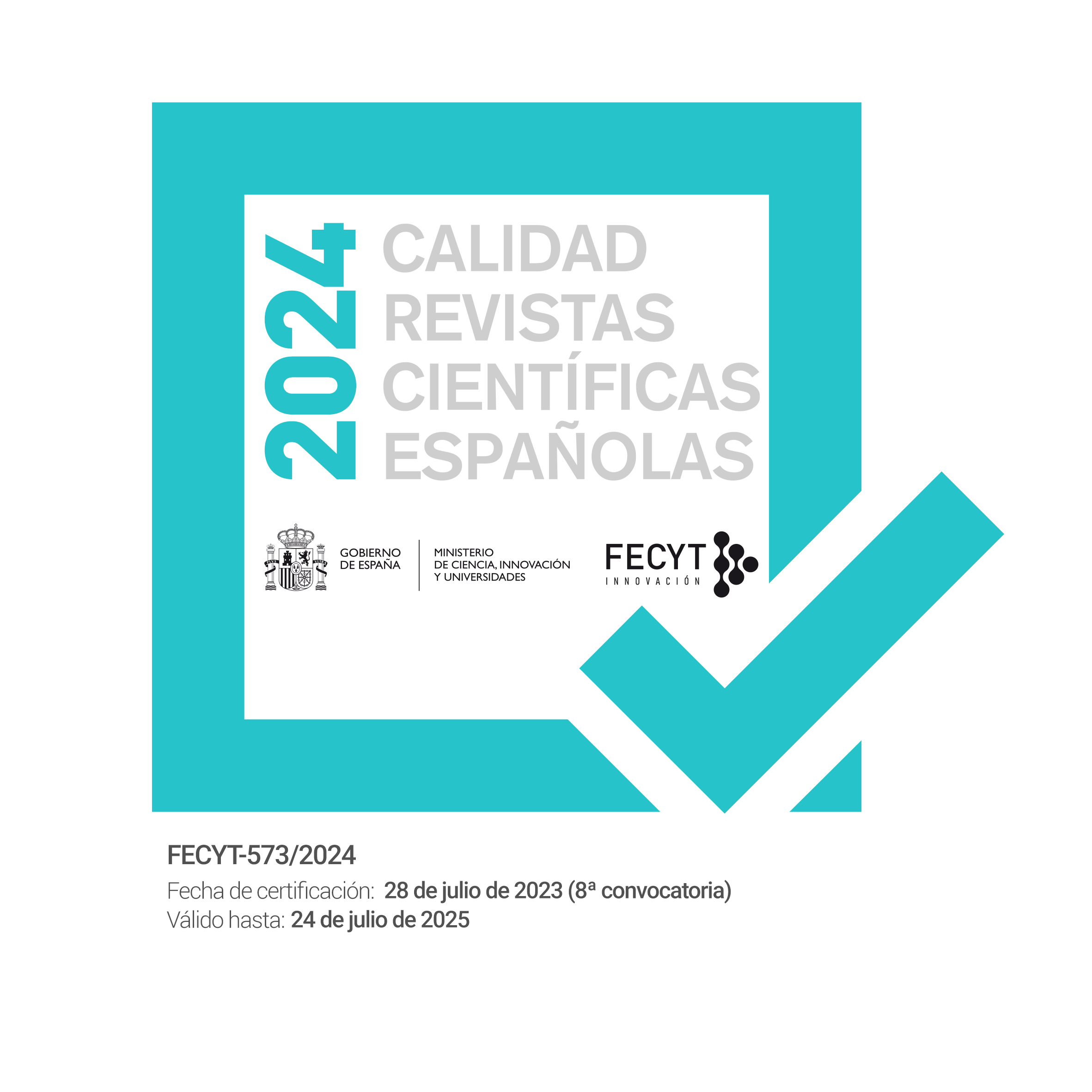Life forms for a transindividual inhabitation: an intentional genealogy from three reflective frameworks.
DOI:
https://doi.org/10.12795/astragalo.2023.i32.04Keywords:
forms of life, common inhabitation, posthumanism, transindividuationAbstract
This reflection explores the possibilities for an architecture that opens up to affirmative political life and an inhabitation as a space of and for life that, goes beyond the universal, exclusive and anthropocentric logic of Humanism.
It proposes to rethink and recompose an alternative and complementary theoretical framework for architecture and inhabitation, based on the concept of forms of life by Ludwig Wittgenstein and its appropriation as forms-of-life by Giorgio Agamben, which extends to the Neomaterialist Posthumanism and Feminism by Rosi Braidotti, the contributions of Roberto Esposito which advocate a conception of life inherently exposed to the world and to others and; to other more localized, emancipatory and pluralistic investigations that contribute to illuminate the debates of the present and renew the humancentric histories and theories of architecture that have been written and taught.
The openness and indeterminacy of this way can offer for the emerging posthuman forms-of-life an inhabitation to be made, open and mutant, suitable for its new form in continuous mutation that, in a context of crisis of inhabitation and vital uncertainty, does not know the metamorphoses it will undergo.
This geneaology tries to be a research device that defines and reinforces itself through openings, escapes and evocations and that operates in a transdisciplinary way allowing a non-repressive existence and habitability to compose a common world in mutation.
Downloads
References
Agamben, Giorgio. 2019. Abitare e Costruire. https://www.quodlibet.it/giorgio- agamben-abitare-e-costruire
Agamben, Giorgio. 2016. The use of bodies. Stanford University Press.
Agamben, Giorgio. 2013. Homo sacer IV. Altísima pobreza. Reglas monásticas y formas de vida. Buenos Aires: Adriana Hidalgo.
Agamben, Giorgio. 2011. “On what we cannot do”. En Nudities, editado por Giorgio Agamben, 43-45. Stanford University Press.
Agamben, Giorgio. 2011. Homo sacer. II. 3. El sacramento del lenguaje: arqueología del juramento. Valencia: Pre-Textos.
Agamben, Giorgio. 2010. Homo Sacer. III. Lo que queda de Auschwitz: El archivo y el testigo. Valencia: Pre-Textos.
Agamben, Giorgio. 2008. Homo sacer. II. 2. El reino y la gloria: para una genealogía teológica de la economía y del gobierno. Valencia: Pre-Textos.
Agamben, Giorgio. 2008. Signatura rerum. Sul método. Milano: Bollati Boringhieri.
Agamben, Giorgio. 2007. “Praise of profanation”. En Profanations, editado por Giorgio Agamben, 73-92. Zone Books.
Agamben, Giorgio. 2005. Lo abierto. El hombre y el animal. Valencia: Pre-Textos.
Agamben, Giorgio. 2004. Homo sacer. II.1. Estado de excepción. Valencia: Pre-Textos.
Agamben, Giorgio. 2003. Homo Sacer I. El poder soberano y la nuda vida. Valencia: Pre-Textos.
Agamben, Giorgio. 2001. Medios sin fin. Notas sobre la política. Valencia: Pre-Textos.
Agamben, Giorgio. 1996. La comunidad que viene. Valencia: Pre-Textos.
Agamben, Giorgio. 1999. “La potenza del pensiero”. En Potentialities: Collected Essays in Philosophy, editado y traducido por Daniel Heller-Roazen. Stanford University Press.
Agamben, Giorgio. 1982. Il linguaggio e la morte. Un seminario sul luogo della negatività. Torino: Einaudi.
Agamben, Giorgio. 1978. Infanzia e storia. Torino: Einaudi. Versión en castellano: Agamben, Giorgio. 2001. Infancia e historia: destrucción de la experiencia y origen de la historia. Buenos Aires: Adriana Hidalgo.
Ambroise, Bruno. 2004. “Bourdieu et Wittgenstein: contributions à une critique de la vision scolastique”. Europe. Revue littéraire mensuelle, 906:258-71. halshs-00338158
Amendolagine, Francesco y Cacciari, Massimo. 1975. “La casa di Wittgenstein”. En Oikos da Loos a Wittgenstein, editado por Francesco Amendolagine, y Massimo Cacciari. Roma: Officina Edizioni.
Blanchot, Maurice. 1983. La communauté inavouable. Paris: Minuit.
Braidotti, Rosi. 2019. “Affirmative ethics and generative life”. Deleuze and Guattari Studies 13(4):463-81. doi:https://doi.org/10.3366/dlgs.2019.0373
Braidotti, Rosi. 2016. “Posthuman affirmative politics”. En Resisting biopolitics. Philosophic, political and performative strategies, editado por S.E. Wilmer y Audronė Žukauskaitė, 3-56. Routledge.
Braidotti, Rosi. 2015. Lo posthumano. Madrid: Gedisa.
Braidotti, Rosi. 2013a. “Posthuman humanities”. European Educational Research Journal 12(1):1-19. doi:https://doi.org/10.2304/eerj.2013.12.1.1
Braidotti, Rosi. 2013b. “Posthuman relational subjectivities and the politics of affirmation”. En Relational architectural ecologies. Architecture, nature and subjectivities, editado por Peg Rawes, 33. Routledge.
Braidotti, Rosi. 2010. “The politics of ‘life itself’ and new ways of dying”. En New materialisms: ontology, agency and politics, editado por Diana Coole, 201-220. Duke University Press.
Braidotti, Rosi. 2000. Sujetos nómades. Buenos Aires: Paidós.
Boano, Camillo y Astolfo, Giovanna. 2020. “Inhabitation as more-than-dwelling. Notes for a renewed grammar”. International Journal of Housing Policy 20(4):555-77. 10.1080/19491247.2020.1759486
Boano, Camillo. 2020. “Forms of (Collective) Life: The Ontoethics of Inhabitation”. Architecture and Culture 8(3-4):549-563. 10.1080/20507828.2020.1802199
Butler, Chris. 2012. Henri Lefebvre. Spatial politics, everyday life and the right to the city. Routledge.
Carmona, Carla. 2017. “Edificar formas de vida. Wittgenstein y Sloterdijk para la interculturalidad”. Ciudad elusiva: Formas de vida y Modos de existencia, Astrágalo. Cultura de la arquitectura y la ciudad 23:15-25.
Cometti, Jean-Pierre. 2011. “Formes de vie". Journal des Laboratoires. http://www.desformesdevie.org/fr/page/formes-vie-par-jean-pierre-cometti
Consejo nocturno. 2018. Un habitar más fuerte que la metrópoli. Logroño: Pepitas de calabaza.
Cruz Aburto, Aura. 2021. “Diseño ontológico transindividual: Un giro afectivo a la propuesta de Escobar”. RChD: creación y pensamiento 6(10):01-19. doi:https//doi.org/10.5354/0719-837X.2021.60877
Deleuze, Gilles y Guattari, Félix. 2002 (1988). Mil Mesetas. Capitalismo y Esquizofrenia. Valencia: Pre-textos.
Esposito, Roberto. 2011. Immunitas: The protection and negation of life. Polity.
Esposito, Roberto. 2010. Communitas. Origin and destiny of the community. Stanford University Press.
Esposito, Roberto. 2008. Bios: Biopolitics and philosophy. University of Minnesota Press.
Esposito, Roberto. 2003. Communitas: origen y destino de la comunidad. Buenos Aires: Amorrortu.
Fontanille, Jacques. 2018. Formas de vida. Universidad de Lima.
Garver, Newton. 1994. This complicated form of life. Chicago: Open Court.
Gier, Nicholas. 1980. “Wittgenstein and forms of life”. Philosophy of the Social Science 10:241-58.
Hardt, Michael y Negri, Antonio. 2011. Commonwealth. El Proyecto de una revolución del común. Madrid: Akal.
Henry, Michel. 2000. Incarnation. Paris: Seuil.
Hunter, John F. M. 1968. “‘Forms of Life’ in Wittgenstein’s ‘Philosophical Investigations.’” American Philosophical Quarterly 5, no. 4:233-43. http://www.jstor.org/stable/20009278.
Jaeggi, Rahel. 2015. “Towards an Immanent Critique of Forms of Life”. Raisons Politiques 57(1):13-29. doi:https://doi.org/10.3917/rai.057.0013
Kishik, David. 2012. Agamben and the Coming Politics. (To imagine a form of life, II). Londres-Nueva York: Continuum.
Kishik, David. 2008. Wittgenstein’s Form of Life. (To Imagine a Form of Life, I). Londres-Nueva York: Continuum.
Lancione, Michele. 2019. “Radical housing: On the politics of dwelling as difference”. International Journal of Housing Policy 20(2):273-89.https://doi.org/10.1080/19491247.2019.1611121
Latour, Bruno. 2012. Enquête sur les modes d’existence. Paris : La Découverte.
Musil, Robert. 1985. “L’allemand comme symptôme”. En Essais. Le Seuil.
Nancy, Jean-Luc. 2000. La comunidad inoperante. Santiago de Chile: Escuela de Filosofía Universidad ARCIS.
O’Connor, Peg. 2008. Morality and our complicated form of life: Feminist Wittgensteinian Metaethics. Pennsylvania State University Press.
Padilla Gálvez, Jesús y Gaffal, Margit. 2012. Forms of Life and Language Games. Heusenstamm: Ontos.
Pitkin, Hanna. 1972. Wittgenstein and Justice. On the Significance of Ludwig Wittgenstein for Social and Political Thought. Berkeley: University of California Press.
Rolnik, Suely. 2014. “Place, inhabitance and citizenship: the right to housing and the right to the city in the contemporary urban world”. International Journal of Housing Policy 14(3):293-300. doi:https://doi.org/10.1080/14616718.2014.936178
Rolnik, Suely. 2006. “Antropofagia Zombie”. En Arte, máquinas, trabajo inmaterial. Brumaria.
Saidel, Matías Leandro. 2014. “Form(s)-of-life. Agamben’s reading of Wittgenstein and the potential uses of a notion”. Trans/Form/Ação 37(1):163-86.
Schmitt, Carl. 2005. El Nomos de la tierra. En el derecho de gentes del “Jus publicum europaeum.” Buenos Aires: Struhart.
Simondon, Gilbert. 2015 (1964). La individuación a la luz de las nociones de forma y de información. Editorial Cactus.
Simondon, Gilbert. 2001 (1958). Du mode d’existence des objets techniques. Paris: Aubier.
Sloterdijk, Peter. 2013. Has de cambiar tu vida. Sobre antropotécnica. Valencia: Pre-Textos.
Teyssot, Georges. 1996. “Hábitos/Habitus/Hábitat”. En Presente y futuros. Arquitectura en las ciudades, Centro de Cultura Contemporánea de Barcelona.
Teyssot, Georges. 2013. A topology of everyday constellations. Cambridge: MIT Press.
Tiqqun. 2000. Théorie du Bloom. Paris: La Fabrique.
Vatter, Miguel. 2017. “Community, life and subjectivity in Italian biopolitics”. En The Routledge handbook of biopolitics, editado por Sergei Prozorov y Simona Rentea, 123-139. Routledge.
Whittaker, John H. 1978. “Language games and forms of life unconfused.” Philosophical Investigations 1.
Wittgenstein, Ludwig. 1999. Investigaciones filosóficas. Barcelona: Altaya.
Wittgenstein, Ludwig. 2003 (1922). Tractatus Logico-Philosophicus. Nueva York: Barnes & Noble.
Downloads
Published
How to Cite
Issue
Section
License
Copyright (c) 2023 Sarah Lahata

This work is licensed under a Creative Commons Attribution-NonCommercial-ShareAlike 4.0 International License.


















